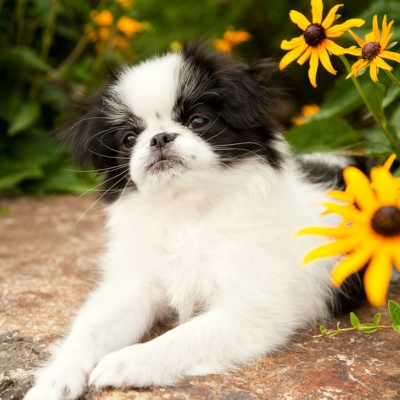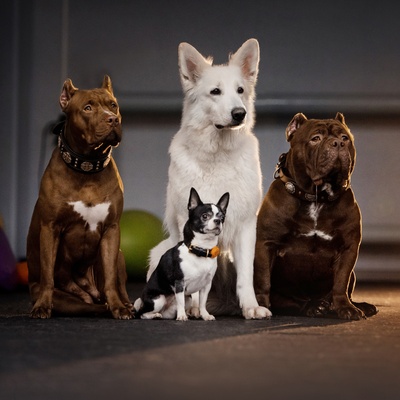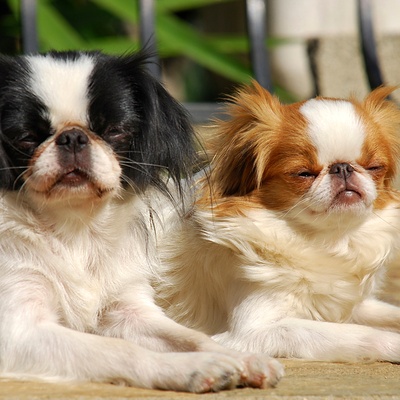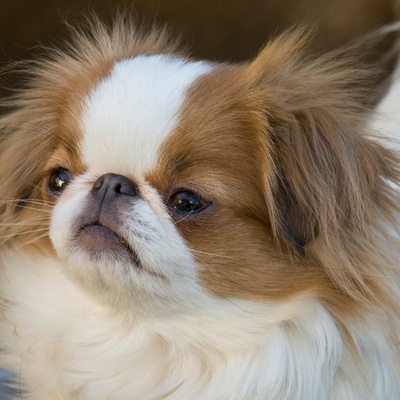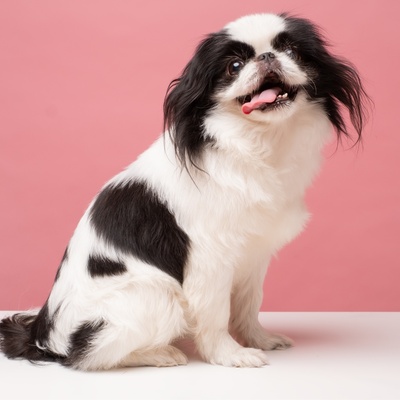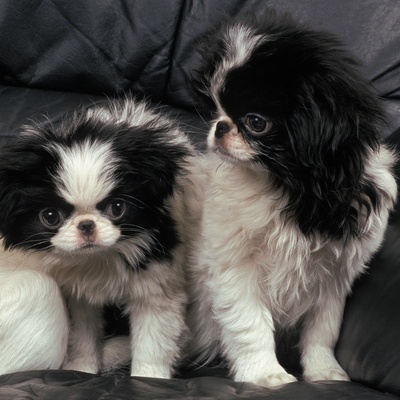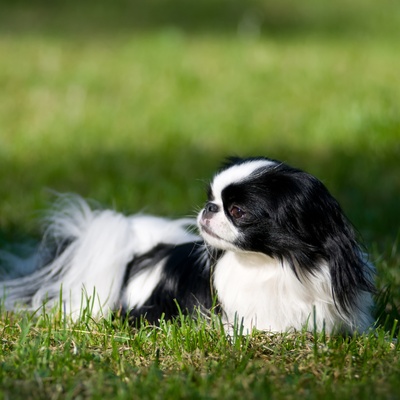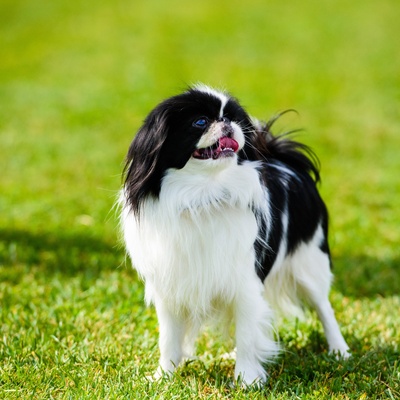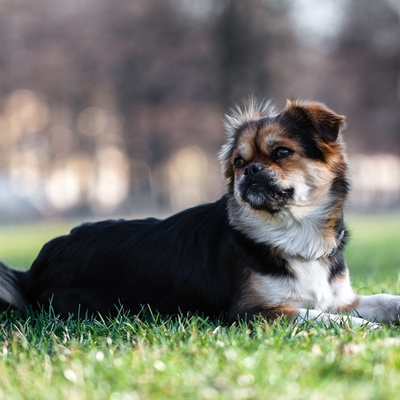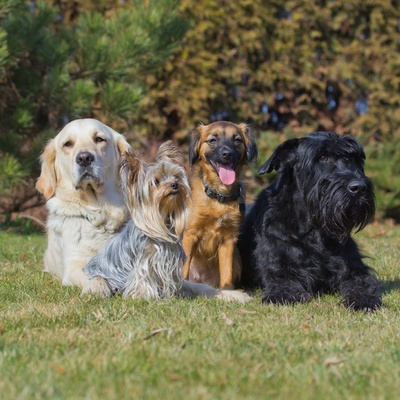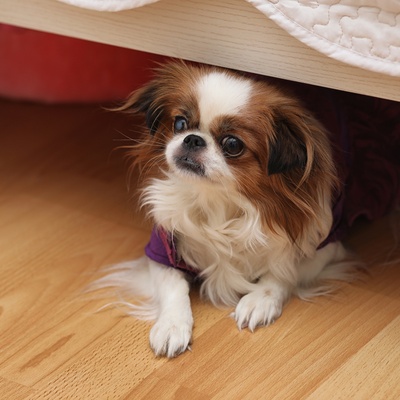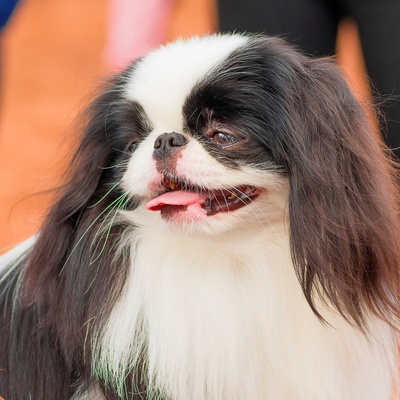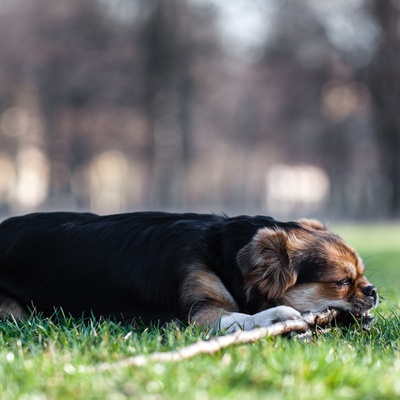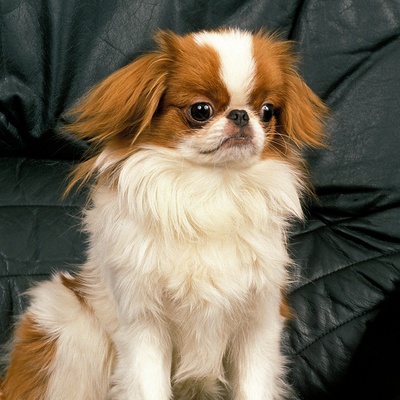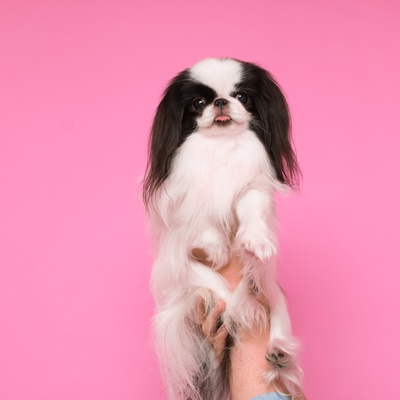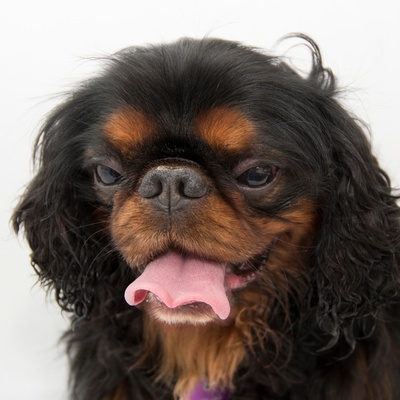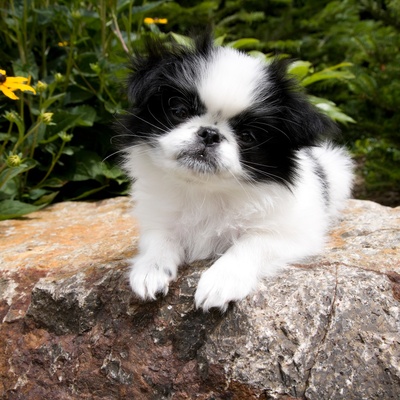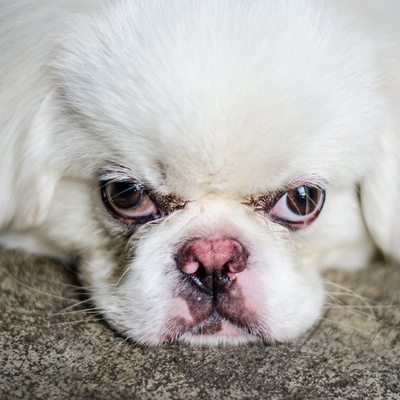Introducing the Japanese Chin
Discover all there is to know about the Japanese Chin: its characteristics, behavior, training, and its cost.
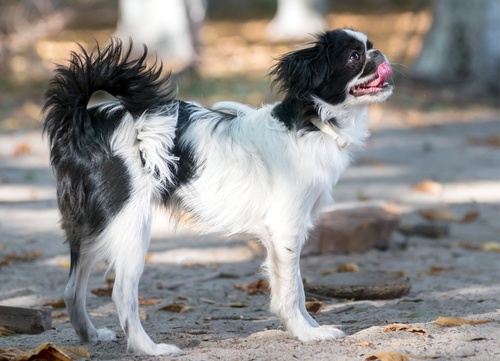
Discover all there is to know about the Japanese Chin: its characteristics, behavior, training, and its cost.
Originating from the noble courts of Japan, the Japanese Chin is a breed that carries the elegance and sophistication of a bygone era into the modern day. Esteemed as much for its distinct appearance as for its aristocratic demeanor, this breed is cherished worldwide, not just for its beauty but for its charming personality. Known for their intelligence and agility, Japanese Chins excel in various roles, from lap dogs to companions in therapy, showcasing their versatility.
With a nature that is both loyal and affectionate, they form deep bonds with their owners, displaying a level of sociability and affection that endears them to all they meet. Their unique combination of elegance, companionship, and playful spirit makes the Japanese Chin a beloved pet and a treasured member of the family.
This section outlines the unique features of the Japanese Chin breed of dog.
The Japanese Chin belongs to the toy group (9), which comprises small dog breeds that are primarily companion pets.
The Japanese Chin is a small breed, with heights ranging from 8 to 11 inches at the shoulder and weights typically between 4 to 9 pounds.
Japanese Chins have a long, flowing coat that is silky to the touch. This luxurious fur requires regular grooming to maintain its elegant appearance.
Their coat comes in a variety of colors, with the most common being white with black or red patches. The exact pattern and distribution of colors can vary greatly among individuals.
Japanese Chins adapt well to almost any living situation, thriving in both apartments and houses as long as they have access to safe, enclosed spaces where they can play and explore.
Known for their friendly and sociable nature, Japanese Chins get along well with children and other pets.
Generally healthy, the Japanese Chin can be prone to certain genetic conditions like heart issues and eye problems.
Japanese Chins are intelligent and can be easy to train with the right approach. They respond best to positive reinforcement and gentle, patient training methods.
We can help!
Every dog has its own character, and so do you. Making the right choice will ensure his well-being and yours.
Take our quiz to find out which breed is right for you, based on your personality, lifestyle, location and many other criteria.
Don't wait any longer and take the quiz to find out the answer!
The Japanese Chin is a small, well-proportioned dog that epitomizes grace and elegance. With a luxurious, flowing coat that typically features striking black and white colors, and a distinct face characterized by large, wide-set eyes and a short, upturned nose, this breed is truly a living work of art.
Japanese Chins are small, with males and females generally standing 8 to 11 inches tall at the shoulder. The weight range for both genders is usually between 4 to 9 pounds, reflecting their dainty stature.
Japanese Chins reach their full size relatively early, with most achieving their adult height and weight by the time they are about a year old, although some may continue to fill out in width and coat until they are slightly older.
The Japanese Chin boasts a long, luxurious coat that is both soft and straight, cascading gracefully over the body. This breed does not have an undercoat, which contributes to the silky texture and flowing appearance of their fur. The absence of an undercoat also makes their fur slightly easier to manage despite its length.
The Japanese Chin's coat comes in a variety of colors, with the most recognized being black and white or red and white. These colors are often well-distributed, with distinctive markings that add to their elegant appearance.
Despite its length, the coat of a Japanese Chin is surprisingly low maintenance due to the lack of an undercoat. They do shed, but less than many other breeds. Regular brushing, about 2-3 times a week, is necessary to keep their fur in top condition and prevent tangles and mats.
Bathing is required only occasionally, every few months, unless the dog becomes particularly dirty. Due to their size and the texture of their coat, care must be taken to dry them thoroughly to avoid chilling.
The Japanese Chin presents a harmonious, well-proportioned silhouette, exuding an air of aristocratic dignity in a compact frame. The head is broad and rounded with a wide, short muzzle, giving it a somewhat brachycephalic appearance. Its eyes are one of its most captivating features: large, round, and set wide apart, they gleam with intelligence and curiosity, usually dark in color.
The ears of the Japanese Chin are small, V-shaped, and set wide apart, often covered in feathering fur that blends seamlessly into the hair on their head, enhancing their elegant appearance. The body, while petite, is sturdy with a level back and a moderate tuck-up, showcasing a subtle musculature that is more about grace than power. This breed moves with a light, stylish gait that complements its refined appearance.
The Japanese Chin is known for its loving, gentle, and somewhat cat-like temperament, displaying a mix of loyalty, grace, and affection with an independent streak.
Within the vast canine world, there are over 400 recognized dog breeds, classified into 10 main groups based on their traits and purposes. The Japanese Chin falls into the Toy group (9), a category that includes breeds such as the Pomeranian, Chihuahua, and Pekingese. These breeds are primarily valued for their companionship and lapdog qualities rather than their working abilities.
The Japanese Chin stands out within this group for its distinct aristocratic bearing, intelligence, and calm, pleasant demeanor. Traditionally bred for the laps of royalty, the primary role of the Japanese Chin today continues to be that of a devoted companion, enriching the lives of their owners with their charming and loving personalities.
The Japanese Chin is a breed that combines regal elegance with a charming sense of mischief. Known for their calm and loving demeanor, they form deep connections with their owners, often becoming closely attuned to their emotions and moods.
The presence of a caring and attentive owner is crucial for their emotional well-being, as they thrive on companionship and affection. Despite their aristocratic appearance, Japanese Chins possess a playful side, delighting in gentle play and interactive games.
With their sociable and amiable nature, Japanese Chins enjoy the company of humans and other pets alike, making them excellent family companions. They are particularly gentle and patient with children, often displaying a nurturing attitude.
Early socialization is key to fostering their innate sociability, helping them grow into well-adjusted adults. Their genial temperament makes them ideal pets for those looking for a breed that balances a dignified presence with a loving, approachable character.
Take the test and find out the dog breed that matches your personality and lifestyle.
The Japanese Chin is remarkably adaptable, capable of thriving in diverse living situations, from the compact spaces of city apartments to the expansive environments of country homes. Daily walks, short and leisurely, typically suffice to meet their physical needs, ensuring their well-being in both body and spirit.
Despite their adaptability to indoor living, Japanese Chins possess a natural curiosity that is well-served by access to safe, outdoor spaces. While not requiring extensive physical exertion, they enjoy the opportunity to explore and engage in mild play outdoors, which caters to their inquisitive nature. An enclosed garden or a secured patio can provide an excellent venue for these activities, allowing them to satisfy their curiosity within a safe environment.
The Japanese Chin is known for its intelligence and ease of learning, often picking up on cues and commands with minimal repetition. However, their training can present unique challenges due to their somewhat independent nature. They respond best to positive reinforcement methods, with rewards and praise being far more effective than strict or negative techniques.
Due to their small size and sociable nature, it's also wise to equip them with a GPS collar, especially when in open or unfamiliar environments, to prevent any potential losses or escapes.
Japanese Chins possess excellent listening qualities, showing a keen ability to understand and follow their owners' guidance when properly motivated. Training this breed requires patience and a gentle touch, as they can be sensitive to harsh tones or commands. Their innate sociability makes them great companions but also means they can be easily distracted, especially by new people or pets. Thus, creating a calm, focused environment for training sessions is crucial for their success. Early socialization plays a significant role in developing a well-rounded, adaptable Japanese Chin, encouraging positive interactions with both humans and other animals from a young age.
The Japanese Chin generally enjoys good health, but like all breeds, requires diligent daily care to prevent common ailments and ensure a long, happy life.
The Japanese Chin is typically a robust breed with few health problems, but they can be predisposed to certain conditions such as heart issues, patellar luxation, and eye problems like cataracts. Symptoms vary depending on the condition but may include coughing, lethargy, or difficulty in movement.
The lifespan of a Japanese Chin is generally between 10 to 14 years, with proper care significantly contributing to their longevity.
Regular veterinary visits are crucial for the Japanese Chin, encompassing vaccinations, deworming, and treatments for parasites as advised by the vet. Daily grooming tasks include brushing their coat to prevent matting, cleaning their ears to avoid infections, and dental care to prevent gum disease. Nails should be trimmed regularly to prevent discomfort.
Additionally, owners should be vigilant about potential allergies, consulting a vet for tailored advice. While the Japanese Chin is not considered a hypoallergenic breed, their minimal shedding makes them a suitable companion for individuals with mild allergies.
The Japanese Chin, like all dog breeds, has specific nutritional needs that are pivotal for sustaining their health and vitality. A balanced diet is crucial, emphasizing the importance of proteins and vitamins to meet their dietary requirements. Premium kibble designed for small breeds offers a comprehensive nutritional base tailored to the Japanese Chin's needs.
For those requiring extra protein, supplementing their diet with lean white and red meats can be beneficial, though it's vital to keep fat content low to avoid weight gain. Given their small size, portion control is essential to prevent obesity, ensuring they receive just the right amount of food to maintain an ideal weight and overall health.
The Japanese Chin is a well-regarded breed known for its elegant appearance and charming demeanor. It's important to consider several factors before adopting, including the breed's needs and whether it matches your lifestyle.
When considering bringing a Japanese Chin into your home, it’s essential to make an informed decision. Ensuring the breeder is reputable involves visiting the premises to check the conditions in which the dogs and puppies are kept and to observe the temperament and health of the animals. The health of the puppy, as well as its parents, is paramount, and reputable breeders will be transparent about any health issues present or potential genetic conditions.
Lastly, you must have your dog microchipped by the age of 8 weeks old and have their details registered on a relevant database like Petlog or Animal Tracker. This is a legal requirement in Great Britain, and non-compliance could result in a
fine. For microchipping, consult your veterinarian. Alternatively, any Blue Cross center will offer this service free of charge.
The initial cost of a Japanese Chin can vary widely depending on several factors, such as the breeder's reputation, the dog's lineage, and whether the puppy has a pedigree. Prices for a Japanese Chin puppy range approximately from
to
.
However, the investment in a Japanese Chin doesn’t stop at the purchase price; potential owners should also consider the ongoing costs associated with the breed, including veterinary care, nutrition, grooming, and any potential health issues. The annual maintenance cost for a Japanese Chin can be estimated at around
to
, varying with the individual needs of the dog and the choices of care and nutrition made by the owner.
Choosing a dog that matches your personality and lifestyle will ensure your well-being and his!
To access the most relevant information, suitable payment methods, and delivery in your region, please select the website corresponding to your country.
